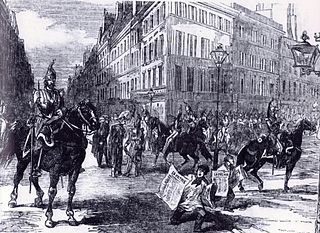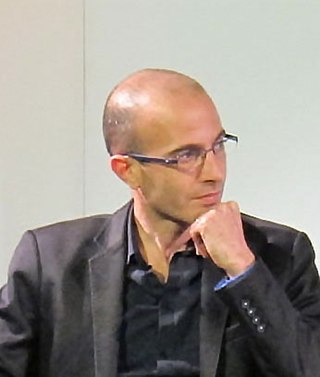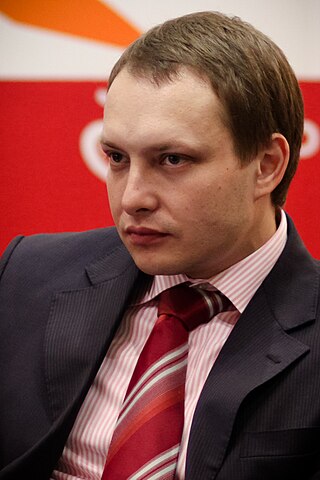
Anne Elizabeth Applebaum is an American and naturalized-Polish journalist and historian. She has written extensively about the history of Communism and the development of civil society in Central and Eastern Europe.

A self-coup, also called an autocoup or coup from the top, is a form of coup d'état in which a nation's head, having come to power through legal means, tries to stay in power through illegal means. The leader may dissolve or render powerless the national legislature and unlawfully assume extraordinary powers not granted under normal circumstances. Other measures may include annulling the nation's constitution, suspending civil courts, and having the head of government assume dictatorial powers.
A Jewish Buddhist is a person with a Jewish background who believes in the tenets of a form of Buddhism.
Amotz Asa-El is a bestselling Israeli author, The Jerusalem Post's senior commentator and former executive editor, and a fellow at the Hartman Institute.

Timothy David Snyder is an American historian specializing in the history of Central and Eastern Europe, the Soviet Union, and the Holocaust. He is the Richard C. Levin Professor of History at Yale University and a permanent fellow at the Institute for Human Sciences in Vienna.

Shmuel Rosner is a Tel Aviv based columnist, editor and think tank fellow. He is currently a Senior Fellow at The Jewish People Policy Institute (JPPI) in Jerusalem, as well as an analyst for Kan News TV. He is the founder and editor of the data-journalism initiative themadad.com, the founder and editor of the nonfiction imprint "The Hedgehog and the Fox", and writer of a weekly column for The Jewish Journal in L.A. and for Maariv in Israel.

The State of Israel is represented in the Russian Federation through an embassy in Moscow and a consulate-general in Yekaterinburg. Russia is represented in Israel through an embassy in Tel Aviv and a consulate in Haifa. Russia is a member of the Quartet on the Middle East. For many years, Israel was a haven for Russian Jews. This was especially the case during the aliyah from the Soviet Union in the 1970s and 1990s. Israel and the Soviet Union, Russia's predecessor state, were on opposing sides during the Cold War. However, the relationship between Israel and Russia has improved significantly since the early 2000s, with the election of the more pro-Israel Russian leader Vladimir Putin, and the election of the more pro-Russia Israeli leader Ariel Sharon. Putin has had a close relationship with long-serving Israeli prime minister Benjamin Netanyahu.

Masha Gessen is a Russian-American journalist, author, translator, and activist who has been an outspoken critic of Vladimir Putin and Donald Trump.

Yuval Noah Harari is an Israeli author, public intellectual, historian and professor in the Department of History at the Hebrew University of Jerusalem. He is the author of the popular science bestsellers Sapiens: A Brief History of Humankind (2014), Homo Deus: A Brief History of Tomorrow (2016), and 21 Lessons for the 21st Century (2018). His writings examine free will, consciousness, intelligence, happiness, and suffering.

Eliot Ward Higgins, who previously wrote under the pseudonym Brown Moses, is a British citizen journalist and former blogger, known for using open sources and social media for investigations. He is the founder of Bellingcat, an investigative journalism website that specialises in fact-checking and open-source intelligence. He has investigated incidents including the Syrian Civil War, the Russo-Ukrainian War, the downing of Malaysia Airlines Flight 17 and the poisoning of Sergei and Yulia Skripal. He first gained mainstream media attention by identifying weapons in uploaded videos from the Syrian conflict.

Sapiens: A Brief History of Humankind is a book by Yuval Noah Harari, first published in Hebrew in Israel in 2011 based on a series of lectures Harari taught at The Hebrew University of Jerusalem, and in English in 2014. The book, focusing on Homo sapiens, surveys the history of humankind, starting from the Stone Age and going up to the twenty-first century. The account is situated within a framework that intersects the natural sciences with the social sciences.

Homo Deus: A Brief History of Tomorrow is a book written by Israeli author Yuval Noah Harari, professor at the Hebrew University in Jerusalem. The book was first published in Hebrew in 2015 by Dvir publishing; the English-language version was published in September 2016 in the United Kingdom and in February 2017 in the United States.

Mikhail Viktorovich Zygar is a Russian born journalist, writer and filmmaker, and the founding editor-in-chief of Russian news channel TV Rain (2010–2015). Under Zygar's leadership, TV Rain provided an alternative to Kremlin-controlled federal TV channels by focusing on news content and giving a platform to opposition voices. The channel's coverage of politically sensitive issues, like the Moscow street protests in 2011 and 2012 as well as the conflict in Ukraine, has been dramatically different from the official coverage by Russia's national television stations. Zygar is also the author of the book All the Kremlin's Men (2017), the history of Putin's Russia, based on interviews with Russian politicians from Putin's inner circle.

Leonid Davidovich Bershidsky is a Russian journalist, publisher and columnist for Bloomberg View, the editorial division of Bloomberg News. He is currently based in Berlin, Germany.

Vera Nikolayevna Polozkova is a Russian poet, actress, and singer.

The Russian Institute for Strategic Studies (RISS) or (RISI) or (RISY) (Russian: Российский институт стратегических исследований (РИСИ)) is a Russian research and analytical center formed by decree by former Russian Federation President Boris Yeltsin in 1992.

Dataism is a term that has been used to describe the mindset or philosophy created by the emerging significance of big data. It was first used by David Brooks in The New York Times in 2013. The term has been expanded to describe what historian Yuval Noah Harari, in his book Homo Deus: A Brief History of Tomorrow from 2015, calls an emerging ideology or even a new form of religion, in which "information flow" is the "supreme value".
The Pushkin House Book Prize is an annual book prize, awarded to the best non-fiction writing on Russia in the English language. The prize was inaugurated in 2013. The prize amount as of 2020 has been £10,000. The advisory board for the prize is made up of Russia experts including Rodric Braithwaite, Andrew Jack, Bridget Kendall, Andrew Nurnberg, Marc Polonsky, and Douglas Smith.

Rebecca Wragg Sykes is a British paleolithic archaeologist, broadcaster, popular science writer and author who lives in Wales. She is interested in the Middle Palaeolithic, specifically in the lives of Neanderthals; and she is one of the founders of TrowelBlazers, a website set up to celebrate the lives of women in archaeology, palaeontology and geology.

Lex Fridman is a Russian-American computer scientist and podcaster. He hosts the Lex Fridman Podcast.

















